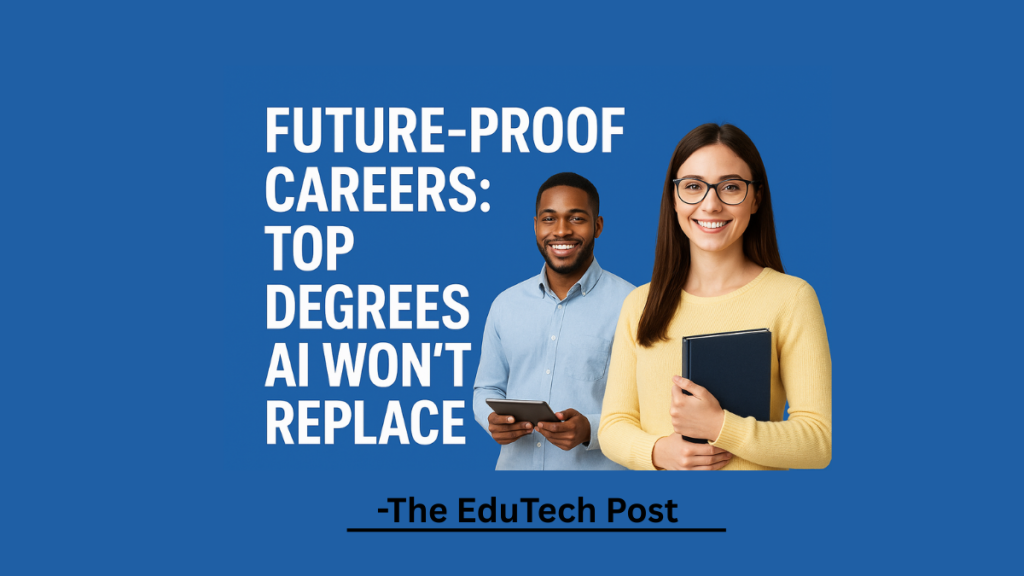
Why Future-Proofing Your Career Matters
Artificial Intelligence (AI) is no longer a thing of the future—it’s here, and it’s transforming our lives faster than ever before. From self-driving cars to AI-powered virtual assistants, the way we live and work is evolving rapidly. But with change comes uncertainty. According to the World Economic Forum, millions of jobs will be reshaped by automation and AI. This leaves students and professionals asking, “Which jobs are safe from AI?”
The answer lies in future-proof careers—fields that thrive on uniquely human qualities such as creativity, empathy, and ethical judgment. These are AI-proof careers where machines can assist but not replace human talent. In this guide, we’ll explore six degrees AI can’t replace and explain why they remain essential in the future of work.
1. Psychology and Mental Health: The Human Connection AI Can’t Mimic
Imagine seeking help during a time of grief or depression. Would you feel understood if your therapist were an algorithm? While AI chatbots can offer generic coping tips, they lack emotional depth and empathy. Psychologists, therapists, and counselors are trusted guides through life’s challenges, and their roles can’t be automated.
Why It’s Future-Proof:
- Emotional intelligence and compassion remain uniquely human.
- Therapy requires cultural awareness, context, and intuition.
- The rising global mental health crisis ensures long-term demand.
Degrees to Consider: Clinical Psychology, Counseling and psychiatry.
2. Education and Teaching: Shaping Minds Beyond Algorithms
AI-powered platforms can deliver lessons, grade assignments, and even suggest personalized learning paths. But true education is more than knowledge transfer—it’s about inspiring curiosity, nurturing resilience, and shaping character. No algorithm can replace the mentorship, support, and sense of community that teachers offer.
Why It’s Future-Proof:
- Human role models are vital for motivation and growth.
- Social and emotional learning cannot be taught by AI.
- Teaching requires adaptability, creativity, and personal touch.
Degrees to Consider: Education, Pedagogy, Early Childhood Education.
3. Law and Ethics: Navigating Complex Human Judgment
Legal software powered by AI can analyze thousands of documents within minutes, but it cannot argue in court or weigh moral dilemmas. Law is deeply rooted in fairness, interpretation, and advocacy—areas where human reasoning is essential.
Why It’s Future-Proof:
- Lawyers must interpret laws in cultural and ethical contexts.
- Advocacy, negotiation, and persuasion demand human presence.
- Policymaking requires foresight, accountability, and responsibility.
Degrees to Consider: Law, Legal Studies, Ethics.
4. Creative Arts and Design: Innovation Driven by Human Imagination
AI-generated art or music can mimic styles, but it lacks original imagination and emotional storytelling. True creativity comes from human experience—artists, writers, and designers draw from culture, history, and emotion to create something new.
Why It’s Future-Proof:
- Creativity sparks cultural movements and innovation.
- Human art carries meaning, identity, and authenticity.
- Risk-taking and experimentation are uniquely human.
Degrees to Consider: Fine Arts, Creative Writing, Graphic Design, Music.
5. Medicine and Healthcare: Healing with a Human Touch
AI can assist with diagnostics and even surgical procedures, but healthcare is not just about treatment—it’s about trust, compassion, and care. Patients seek reassurance, empathy, and ethical decision-making, which only human healthcare professionals can provide.
Why It’s Future-Proof:
- Ethical dilemmas in healthcare require human judgment.
- Compassion and empathy are central to recovery.
- Complex medical cases often need intuition beyond data.
Degrees to Consider: Medicine, Nursing, Public Health.
6. Social Work and Community Services: Building Trust and Compassion
Communities rely on social workers to address challenges like poverty, inequality, and abuse. These roles demand cultural understanding, adaptability, and genuine compassion—qualities AI does not possess. Human-led advocacy and support remain irreplaceable.
Why It’s Future-Proof:
- Builds trust and deep human connections.
- Adapts to unique cultural and societal needs.
- Involves advocacy, activism, and empathy-driven action.
Degrees to Consider: Human Services, Community Development, and Social Work.
The Future of Work: Blending Human Skills with AI Tools
Choosing a future-proof career doesn’t mean avoiding AI—it means learning how to work alongside it. AI can simplify repetitive tasks, but it’s the human-centered skills that make professionals irreplaceable. Students who combine technical literacy with creativity, empathy, and critical thinking will thrive in the future workplace.
Future-Proof Skills to Develop Alongside AI:
- Critical Thinking and Problem Solving.
- Emotional Intelligence.
- Creativity and Innovation.
- Ethical Decision-Making.
- Communication and Collaboration.
Choosing Degrees That Keep You Irreplaceable
AI is powerful, but it cannot replace human empathy, imagination, or ethics. By pursuing degrees in psychology, education, law, creative arts, medicine, and social work, you secure more than just employment—you ensure a meaningful career path where human values always outshine technology.
 The lesson? Don’t just ask which jobs AI will replace—invest in careers where AI enhances your abilities, but your humanity makes you indispensable.
The lesson? Don’t just ask which jobs AI will replace—invest in careers where AI enhances your abilities, but your humanity makes you indispensable.
Also Read: Is AI Enhancing Learning or Replacing Traditional Education?
The post Future-Proof Careers: Top Degrees AI Won’t Replace first appeared on TechToday.
This post originally appeared on TechToday.
